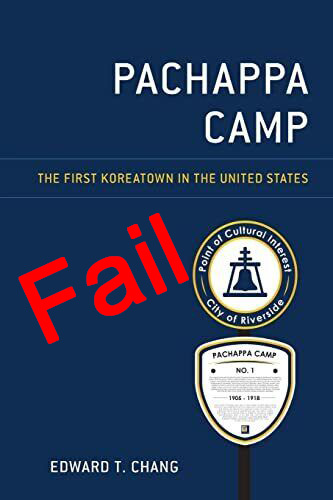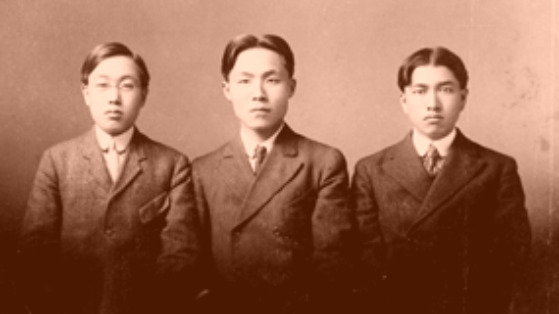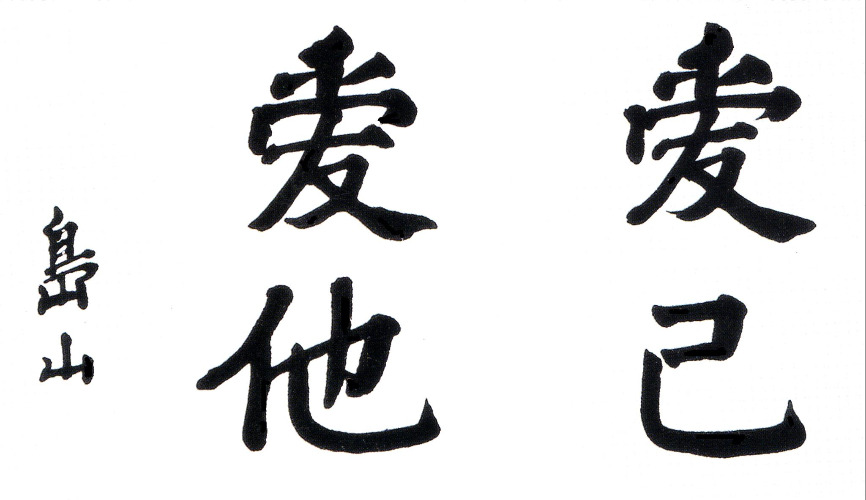"Research is a quest for truth. The research must be well conceptualized with a clear research question(s) which can lead to new knowledge. Good ethics and integrity dictate that the truth must be presented in its absolute form, and the findings need to be appropriately interpreted and should be reproducible." iiasa.ac.ac Pachappa Camp research was not a quest for truth!
I have openly challenged and still challenge Anyone from UC Riverside and The City of Riverside to a Public Debate about Pachappa Camp.Why are they hiding? It is a Hoax!
Dr. Elaine Kim, Dr. Angie Chung and Dr. John Park have also declined my challenge to debate. It's too risky to back up their endorsements since none of these "scholars" have any credible background in Pioneer Generation and Independence Movement history.

Pachappa was a Migrant Labor Camp not Koreatown
The book Pachappa Camp is a faulty incorrect account of history. Absolutely not recommended.
No Pioneer Generation Korean or Ahn Chang Ho Family who knows history called Pachappa Camp a Koreatown because it wasn't one! South Korean immigrants, politically ambitious South Koreans, opportunistic non-Koreans
and Pro-Japanese Koreans have willfully distorted the truth about Riverside.
The information about Dosan Ahn Chang Ho and his family, the development of Korean labor and political organizations is incorrect and misleading. Calling Riverside the Mecca of Korean Independence is an injustice to Korean and Korean American history. This is a hoax created by the University of California, the City of Riverside, the South Korean Consulate of Los Angeles and countless ignorant South Korean Americans.
How any college professor could pass this off as University level academic research is pathetic. Any college professor or institution endorsing this book is irresponsible. The writing itself is Junior High School level at best. With no concern for facts Rowman and Littlefield/Lexington Books did not review or fact check anything in this book. Pachappa Camp has harmfully set back Korean American history studies damaging generations to come.

UC Riverside 1904 and UCLA 1905 - Claims different date for same picture? Both False - Date is 1912
This photograph of Ahn Chang Ho with orange pickers of many ethnic backgrounds is not from 1904 or 1905 as UC Riverside and UCLA claim. It was taken in January 1912 before Dosan left Riverside for San Francisco. Dosan is the third man from left with a mustache. Look right to the picture of Dosan from 1905 - clean shaved. The group picture above is from a series of photographs taken in Riverside in January 1912 to be used in ads for Korean labor in the Kongnip Shinbo (newspaper) in San Francisco. However, The Great Freeze of late 1912 and 1913 shut down Korean labor in the citrus industry for years. Koreans fled Pachappa because there was no work since Koreans were the last to be hired. Only a few Koreans remained. In 1920 there were only 20 Koreans in Riverside.
Recently the date of this photo of Koreans in the orange groves of Alta Cuesta Orchard in Riverside, California has been misrepresented by UC Riverside in the First Koreatown Photo Exhibit. Using the incorrect date alters the history of early Koreans in America and Dosan to support hidden agendas not to support accurate history and teaching the truth.
UCLA supports the wrong information. I presented this issue in an email to Letters and Sciences Dean David Schaberg years ago. He ignored my request for correction and credited the misinformation to USC blaming Korean Library and Joy Kim.
This picture was first exhibited and published in the Helen Ahn Collection in the 1980's in Los Angeles, California. It was archived in 1982 and sent to Korea in 1984. It was published in 2000 in the Complete Works of Dosan Ahn Chang Ho Vol. 14. Helen Ahn collected thousands of valuable historical documents and photographs that opened a closed door to modern Korean history. This picture and most online early Korean images in America are from the Helen Ahn Collection. For years, I worked on this collection with Susan Ahn Cuddy (my mother) and Kenneth Cho of the Hungsadan.The collection was donated to The Independence Hall of South Korea. It was on display in Seoul's National Museum in 1984 until it went to the Independence Hall of Korea in 1987.
I know this collection keenly. I am the only manager of it. The contract is on record with the South Korean Government. Almost every image UC Riverside uses originated from the Helen Ahn Collection I manage. Unfortunately, the Independence Hall of South Korea has not acted as a responsible steward of the Helen Ahn Collection. On Tuesday March 8, 2023 I met with South Korean Consulate and informed Deputy Consul General Kwon there are serious problems the South Korean Government needs to acknowledge and correct.

Dosan had No Mustache until After 1911. How could the picture to the left be taken in 1904 or 1905?
A picture is worth a 1,000 words. DOSAN DID NOT HAVE A MUSTACHE in 1905 as seen in this earliest picture of the Kongnip Hyophoe in San Francisco above. UCLA and UC Riverside both boast UC employees are prolific researchers!
When it comes to Pioneer Korean and Independence Movement History non-Korean people are easy to fool. Sadly, people all over the world who are Korean or of Korean heritage are easy to fool about their history, also. Shamefully, many people who are trusted sources of information have fooled the public interested in Korea with freewheeling unproven claims, gross misrepresentations and revised facts.
Judy Woodruff and Stephanie Sy of PBS, Sakshi Venkatraman of NBC, Jill Cowan of NYT, Frank Shyong of the LA Times, Hyungwon Kang of the Korea Herald and too many"professional" journalists were easily suckered by the revised history of the Pachappa migrant labor camp. These "professionals" and others were irresponsibly lazy not checking any facts. What was the benefit of popularizing a fake First Koreatown? Today, news is contrived entertainment more than the truth and facts have less influence on programming. Pachappa Camp First Koreatown is a clear example of strategic misinformation being blindly bought as truth. Another example journalists and networks can no longer be trusted.
When supposed scholarly people like Professor Edward T. Chang Director of the UC Riverside Young Oak Kim Center, The Dean of Letters and Sciences at UCLA and Ken Klein former Director of the USC Korean Library perpetuate bad information it damages history. Because of their credentialed positions in higher education it is difficult to persuade people their claims are revisionism with an accuracy problem. The specific use of the incorrect information - like dates - places propaganda over accurate facts.
Deputy Consul General Kwon has been at the LA Consulate for 17 years. His continuous blindly bowing down to unqualified "scholars with degrees" also perpetuates the harm to Pioneer Korean and Independence Movement history.
UC Riverside uses unjustified claims as part of its spreading incorrect history. Here are three easy to prove incorrect claims based on revisionism and misinformation:
- Riverside is the Mecca of the Independence Movement - Where is the proof this is the most sacred spot on Earth to a Korean during the Independence Movement? A Mecca doesn't move from place to place. Nothing about Dosan's life supports this is idiotic conjecture.
- Riverside is the First Koreatown - In 2004 Lee Sun Ju came up with this hoax in an unqualified analysis of the 1908 Sanborn Fire Insurance Map. Lee Sun ju guessed it was a blue print and his ambitious imagination replaced determining facts. Mike Myung Ki Hong bought the idea and funded the myth to feed his self-interest. If ultra wealthy Hong did not live or own a company in Riverside this hoax would have never started. The City of Riverside and The Young Oak Kim Center for Korean Studies hero-worshiped Hong's money and substituted a fantasy for history.
- 1000 Koreans In Riverside - in a First Koreatown article Jill Cowan of NY Times reported there were 1000 Koreans in Riverside at Pachappa Camp. There never were 1000 Pioneer Generation Korean residents in Riverside, California when Pachappa was a labor camp. There are no US immigration statistics reporting 1000 Koreans in the entire State of California when Pachappa was used as a labor camp.
